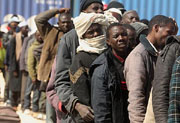-
(单词翻译:双击或拖选)
Report: Migrants Often Scapegoats2 for Society’s Problems
A new report says few areas of public policy are subject to greater bias3, polarization and political debate than migration4. The International Organization for Migration, IOM, calls it one of the most misunderstood issues of our time.
The IOM says we’re living in an era of the greatest human migration in recorded history, calling it one of the defining features of the contemporary world.
“Nobody can deny that migration will play a bigger even role in the future. So, you love it or hate it, but migration is here to stay, said IOM spokesman Jumbe Omari Jumbe, adding, “It is a natural process in human evolution, if you like.”
Let’s talk about it
The new report is entitled World Migration Report 2011: Communicating Effectively about Migration. It recommends a fundamental shift in the way people talk about it.
“There is a lot of negative reporting. Not only negative reporting, but also there is a lot of misrepresentation of the migration debate. And we think that by allowing migrants themselves to speak about themselves rather than being spoken about them, this will at least rectify5 the imbalance that exists today,” he said.
 |
| Migrant workers from Africa stand in a line after they arrive by ship from Misrata during an evacuation operation organized by the International Organization for Migration (IOM) at the port of Benghazi May 5, 2011. REUTERS/Mohammed Salem |
Jumbe said the media are partly to blame for the misrepresentation.
“First of all, the media do not represent the migrants themselves and very few media houses have migrant staff members. And the second thing is that most of the media houses we have followed do not understand the migration issue. Migration is a very complex issue,” he said.
Blame game
Jumbe said migration has become a scapegoat1 or catchall issue that “masks the public’s fear and uncertainties6.”
“So migration is blamed for everything, starting from economic, social and even political issues. So this is a huge misrepresentation because it does not look at all sides of migration. We don’t deny that there are some negatives in migration,” he said.
For example, migrants may put a strain on social services or act in a way that is criticized by host communities. But Jumbe says the positives outweigh7 the negatives through an exchange of talent, services, skills and diverse experience. In addition, migrants send billions of dollars to their home countries in the form of remittances8. These may be a huge part of national budgets.
The IOM report also says the public often overestimates9 the size of the migrant populations in their country. In the United States, for example, an opinion poll indicated the public believed migrants made up 39 percent of the population. The actual figure was 14 percent. Another poll showed Italians believed migrants were 25 percent of the population, when in reality the figure was seven just percent.
 收听单词发音
收听单词发音
1
scapegoat

|
|
| n.替罪的羔羊,替人顶罪者;v.使…成为替罪羊 | |
参考例句: |
|
|
|
2
scapegoats

|
|
| n.代人受过的人,替罪羊( scapegoat的名词复数 )v.使成为替罪羊( scapegoat的第三人称单数 ) | |
参考例句: |
|
|
|
3
bias

|
|
| n.偏见,偏心,偏袒;vt.使有偏见 | |
参考例句: |
|
|
|
4
migration

|
|
| n.迁移,移居,(鸟类等的)迁徙 | |
参考例句: |
|
|
|
5
rectify

|
|
| v.订正,矫正,改正 | |
参考例句: |
|
|
|
6
uncertainties

|
|
| 无把握( uncertainty的名词复数 ); 不确定; 变化不定; 无把握、不确定的事物 | |
参考例句: |
|
|
|
7
outweigh

|
|
| vt.比...更重,...更重要 | |
参考例句: |
|
|
|
8
remittances

|
|
| n.汇寄( remittance的名词复数 );汇款,汇款额 | |
参考例句: |
|
|
|
9
overestimates

|
|
| 对(数量)估计过高,对…作过高的评价( overestimate的第三人称单数 ) | |
参考例句: |
|
|
|















